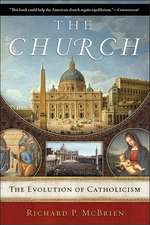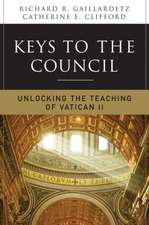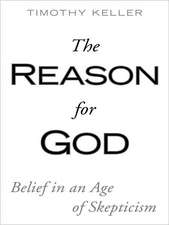A Political History of Early Christianity
Autor Allen Brenten Limba Engleză Paperback – 31 aug 2009
Preț: 301.57 lei
Preț vechi: 328.01 lei
-8% Nou
57.71€ • 60.53$ • 48.04£
Carte tipărită la comandă
Livrare economică 01-15 aprilie
Specificații
ISBN-10: 0567031756
Pagini: 344
Dimensiuni: 156 x 234 x 20 mm
Greutate: 0.52 kg
Ediția:New.
Editura: Bloomsbury Publishing
Colecția T&T Clark
Locul publicării:London, United Kingdom
Caracteristici
Cuprins
Recenzii
Allen Brent is one of the boldest and most seminal historians currently writing about Christianity in the ancient world. In his works on Hippolytus and Ignatius, he has already displayed his magisterial learning and his ability to shed new light on the history of ideas by the investigation of social and cultural backgrounds. If he is not one to be carried away on a bandwagon, he is also not one to neglect a theory merely because it is difficult or because it has become dangerously fashionable in other disciplines. His aim in the present book is to examine the relation between metaphysical theories and their political contexts, with a broad remit in the interpretation of the terms "metaphysical" and "political". The introduction promises an astute engagement with such figures as sociologist Peter Berger, intellectual historian Quentin Skinner and the virtuoso of the social sciences, Max Weber. In his opening chapter he plunges dauntlessly into the thickets of New Testament scholarship, doing ample justice to the arguments of those who deny an eschatological character to the original preaching of Jesus, but showing at the same time that their attempts to cast Jesus as an ascetic teacher for the present world exaggerates the significance of non-canonical texts and is patently motivated by contemporary interests. The writing is characteristically lucid, the scholarship impeccable, the argument brisk but incisive; if this chapter is an augury of the rest, we can expect another distinguished addition to a corpus of scholarship that is already impressive.
Allen Brent's latest book both marks a continuation of a long-term research project seeking to relate early Christianity to its pagan context, religious, political, social, and cultural, and a fruitful bringing together of a series of his concerns and interests. Thus writing a political history of early Christianity enables him to deploy his considerable learning in a wide range of fields and disciplines taking in contemporary political issues, sociology, the history of philosophy and theology, as well as those involved in the study of the early church in its pagan context. Thus in addition to treatments of ancient political theory and pagan and Christian religion, theology and philosophy, we get insights from ancient history, epigraphy, numismatics, art and architecture. Thus he points to the unity of nature and society and the way the natural was believed to echo the cosmic order. Furthermore for him the impact of ideas on events is as important as of events on ideas. His reconstruction of pagan political theories from Augustus to Decius and demonstration of the influence of Stoicism is particularly valuable in this regard. Perhaps the most intriguing and stimulating chapters are the first two, arguing against much contemporary scholarship, particularly North American, that Jesus, whatever we make of him himself as a historical figure, cannot be separated from an apocalyptic understanding, and setting Mark's Gospel firmly in the context of the turbulent events in Rome and Judaea of AD 68-9. In chapter six Brent offers a valuable discussion of Callistus and his significance, developing themes of his book on Hippolytus with further appeal to the archaeological evidence. But the book is a considerable achievement, offering an intriguing and plausible thesis about the way Christianity had to adapt its original apocalyptic vision to contemporary pagan views to survive and flourish, transforming paganism in the process, while in the end retaining some elements of apocalyptic. On the way he supplies various illuminating modern parallels as well as many provocative ideas typical of him (such as that Justin was a presbyter bishop and that Lucian knew Ignatius) in a book that will keep people arguing for some considerable time.'
Readers are quickly immersed in the scholarly depths of classical history and archaeology, yet at the same time Brent repeatedly cuts through the centuries to pose some very modern questions about the nature of authority and the meaning of the Christian message.
"Historian Brent traces the history of early Christianity as a political movement with serious political challenges to the Pagan Empire, which pagans noticed and tried to stay away from. He argues that the hostility between Paganism and Early Christianity was not always caused by misunderstanding, but was often resistance to overt or surreptitious growth in both the order of Christian societies and the development of the theology that underpinned that order. Among his topics are the Jesus of history, his movement, and the politics of his day; the political theology of the Augustan revolution and John the Seer's apocalyptic response to it; the apologists and politics of the Trinity; the opposing eschatologies of Cyprian and Decius and the creation of a state within a state; and Constantine, the divine order of the Christian Empire, and its European legacy.
This is a creative, well-written, well-argued book that deserves the attention of scholars of early Christianity. Highly recommended.
A Political History of Early Christianity is dense, well-researched and full of insightfully and nuanced analysis... [This book] brings to light the origins of the Christian political tradition and, in doing so, illuminates much else, including scripture, theology and church history.
Descriere
Brent focuses on the reformation of republican religion and the exercise of political authority in Augustan society. Augustus' revolution involved a reformation also of republican religion that provided legitimation for the exercise of political authority. The iconography of the Ara Pacis, for example, shows that Augustus as augur was making a metaphysical claim, namely to have secured the peace of the gods not simply throughout the civil organization of the empire but also in nature itself. What republican religion had failed to do, his reformed religion had succeeded in doing. Thus Augustan society had reached a formally similar position to the world of the late twentieth century with its own version of the 'end of history' (Fukuama) in which not simply all other practical political alternatives seem to have been excluded but ideological (or metaphysical) ones as well. How was Christianity, if it were to achieve transformation of contemporary society, to respond to such an apparently unassailable position? How indeed was it to develop both the aim and the strategy for so doing? It needed to shed its original apocalyptic solution in which the certainty of the imminence of the second advent meant that there was no need for actions with political implications in this world. Such a process bears comparison with the way in which Marxists active in Western democracies refused involvement in normal political processes whilst they awaited the 'inevitable' collapse of 'capitalism.' It needed to turn from a perspective of inner soul-culture that had no interest in the transformation of wider society (Gnosticism). Such is paralleled by a kind of charismatic fundamentalism in the present. It needed to produce a 'project' that would be effective in transforming its values into a form that bore convincing parallels to the values of the dominant culture that its was endeavoring to influence in order to secure wide support for its access to power.







